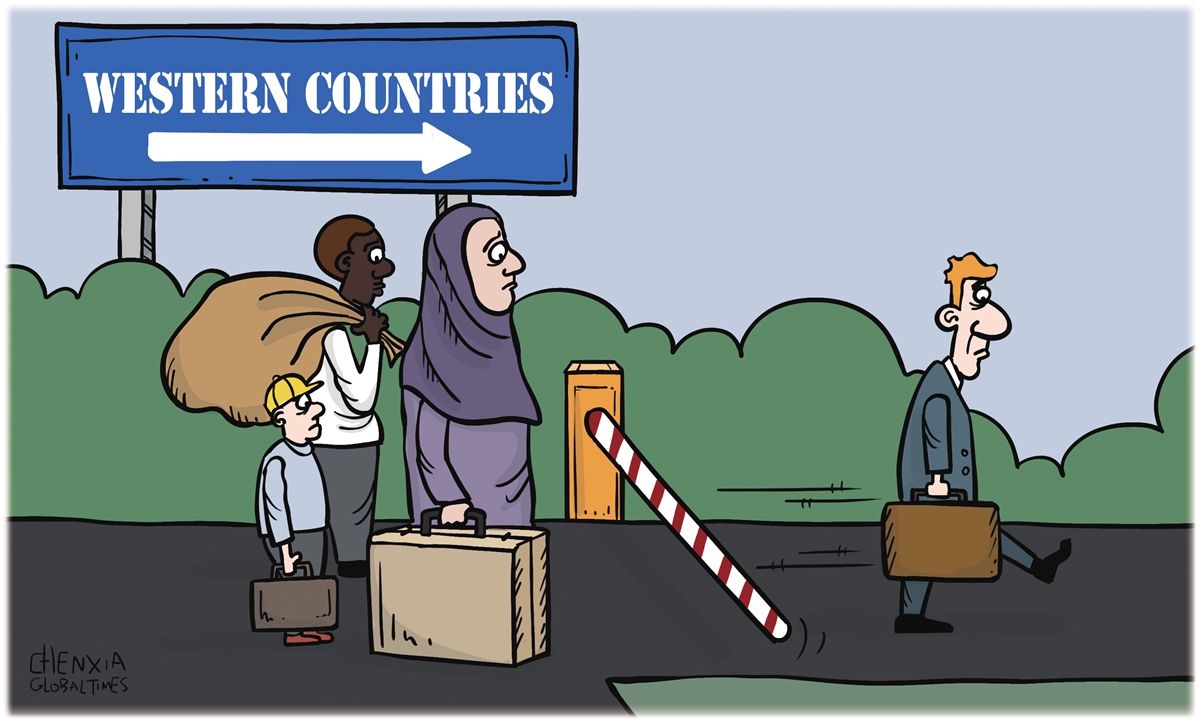
Illustration: Chen Xia/GT
The conflict between Russia and Ukraine has led to the worst refugee crisis in Europe since World War II. The number of refugees leaving Ukraine has surged to nearly 3 million. The US and some European countries have opened their doors to accept these refugees, but in the process, politicians and public opinions in some countries have compared them with refugees from the Middle East, exposing double standards and even racism on the refugee issue.
The refugee policies of European countries are not consistent. Over the past few years, they have treated refugees of different origins and skin colors very differently. When the Syrian refugee crisis in 2015 and the Afghan refugee crisis erupted last year, many European countries locked their doors.
In the current Ukrainian refugee crisis, they have opened their doors, but in practice, they divide refugees into different classes and even apply racial discrimination. Tens of thousands of African and Middle Eastern expatriates living in Ukraine faced difficulties when leaving the country. What's more, some ultra-nationalists in European countries deliberately searched for people of color among refugees and carried out violence against them.
First, these phenomena are essentially Western-centrism and racism. The interpretation of refugee policy in the Western country profoundly reflects the arrogance and prejudice of white supremacy. Some influential media persons and politicians see Ukraine as part of the Western world, and define Ukrainian refugees as "white, Christian and middle class" and "our own people." "This isn't a place, with all due respect, like Iraq or Afghanistan, that has seen conflict raging for decades," said CBS News correspondent Charlie D'Agata.
This shows that not all refugees deserve sympathy in the Western concept. The "equality of all", which is regarded as a standard in the West, is actually "some people are more equal than others." Refugees from Africa, the Middle East, and Central Asia are not so lucky.
Second, the West politicized the refugee issue in an attempt to harm Russia by welcoming Ukrainian refugees. The Russia-Ukraine conflict has its historical complexities, and its roots are intricate. Not only are the US and the West unqualified to use the refugee crisis to put down Russia morally, they themselves are to blame. They are behind the many refugee problems in the world today.
The US is undoubtedly the culprit of refugee problems in countries like Iraq and Afghanistan. However, when it comes to accepting refugees from these countries, the US pushes back and evades responsibility. Such double standards make it hard to believe that is what the world's superpower and self-proclaimed human rights defender did.
Third, the rejection of refugees from the Middle East reflects the prevalent "Islamophobia" in Western societies. In the name of counter-terrorism, the US has ruined lives in Islamic countries such as Iraq and Afghanistan, resulting in a large number of people becoming refugees. However, refugees from these countries are randomly labeled as dangerous groups or even "terrorists" by the US and the West. Western countries stigmatize and demonize Islam, one of the world's three major religions, and Muslims, who account for one-fifth of the world's population, to deepen estrangement and hinder mutual understanding between civilizations and religious reconciliation.
The Russia-Ukraine conflict also mirrors the double standards of the West on human rights issues. Since the worsening of the situation, Western politicians and media outlets have paid close attention to the so-called humanitarian damage caused by the conflict. But for a long time in the past, they have turned a blind eye to the wars, deaths and displacement in the Middle East and North Africa. To a large extent, the US and the West are themselves the creators of local unrest and the refugee crises. The history of the treatment of refugees by the US and the West is not as full of "humanity" as some claim it to be. The image as a "savior" they built on the Ukrainian refugee issue is collapsing.
The author is a professor at the Institute of Middle East Studies, Shanghai International Studies University. opinion@globaltimes.com.cn




